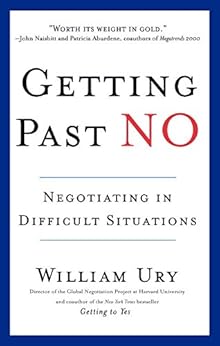
Another negotiating book I read recently is William Ury’s Getting Past No: Negotiating in Difficult Situations. This is an extension of Getting to Yes, but it focuses on an arena that Getting to Yes does not attend to in as much detail – the biggest obstacles to negotiation from an emotional standpoint and in terms of resistance.
The book treats emotional and resistance barriers more through the lens of substantive negotiation as opposed to offering a deep dive on the true impact of emotions. Another book I’m reading now that does that is Beyond Reason by Fisher and Shapiro, which I’ll review soon. However, this is a helpful book related to developing strategies to find common ground for agreement in high difficult situations or negotiations where maybe there is significant resistance from one source or another.
The essential framework for this book is simplified into these key approaches when there is significant resistance to negotiation:
- Reflect instead of react. Exercise self-awareness and self-regulation so that emotions do not drive the negotiation.
- Agree instead of argue. Don’t give in, but instead of arguing or increasing positional tension try agreeing with everything you can possibly agree with to help keep positive engagement with the real interests involved.
- Reframe instead of Reject. Don’t just throw out the other person’s position but try to explore the interests by reframing the issues in ways that allow for mutual problem-solving.
- Collaborate instead of Sell. Don’t push your own agenda, but really work for mutual satisfaction and that interests are met on all sides.
- Create, don’t Escalate. If things start breaking down, don’t escalate conflict but seek to find creative solutions to keep things focused on interests and generating possible solutions.
So the book is really an extension of Getting to Yes, but there are great stories about these things being implemented in real negotiations. But it’s helpful to think about these things BEFORE negotiation or conversations go bad. It’s helpful to be prepared for how to handle negative resistance as we often don’t expect it and as a result, our response to it ends up being poor or reactive.
Of the above – they all have merit, but I think #3 is perhaps most crucial because I think it helps shape a mindset that allows you do to #4 and #5 better. I think this book and other books don’t always include tons of cross-cultural reflection or insights, so that is an intriguing arena for further reflection. In some ways, I think Ury’s principles work well in Honor Shame and other contexts. Emotional self-regulation is key and having a more relational and community perspective is crucial.
I suggest googling some summaries as you can get the gist of this book in a few places on the web and you can even find some pdf’s of some older versions of the book for download.
